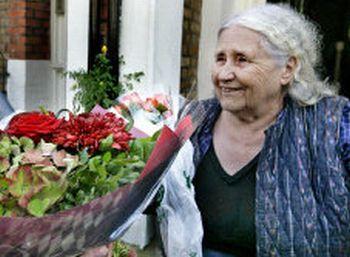London, November 17: Doris Lessing, one of Britain’s most-influential authors and a Nobel Literature laureate, has died at 94, her family said Sunday.
From a lifetime of writing came more than 80 books, including poetry, two operas, short stories, plays and non-fiction. In 2007, the 88-year-old Lessing became the oldest recipient of the Nobel Prize and only the 11th woman to win the award.
The Swedish Academy described her as “that epicist of the female experience, who with scepticism, fire and visionary power has subjected a divided civilisation to scrutiny.” Nicholas Pearson, her editor at HarperCollins, said: “Doris’s long life and career was a great gift to world literature,” the Press Association reported.
“Probably she’ll be most remembered for The Golden Notebook which became a handbook to a whole generation, but her many books have spoken to us in so many various ways,” Pearson continued.
Published in 1962, The Golden Notebook is Lessing’s best-known work, regarded as an emancipating classic by feminists.
“Even in very old age she was always intellectually restless, reinventing herself, curious about the changing world around us, always completely inspirational. We’ll miss her hugely,” Pearson said.
Lessing was born on October 22, 1919, in Kermanshah, Iran, where her father, British colonial officer Alfred Cook Taylor, worked for the Bank of Persia. When she was 3, the family settled in southern Rhodesia (now Zimbabwe).
Her mother, a nurse of Scottish-Irish descent, made sure that a steady supply of childrens’ books was shipped to the former colony so that Doris would not get bored.
“I was reading all the time,” she said of her years in Africa.
From her early novels about her youth in colonial Africa, to feminism, politics and her later fascination with the limits of consciousness, Lessing never flinched from depicting uncomfortable truths while displaying an unshakeable belief in human progress.
Her first novel, The Grass Is Singing (1950), is about a woman trapped in a doomed marriage in a troubled country, a stinging critique of racial politics in the former Rhodesia.
Lessing left Rhodesia at around the time the novel was published, settling in London where she began the autobiographical Children of Violence sequence, which explored the developing consciousness of her heroine, Martha Quest.
In 1939, she married Frank Charles Wisdom, with whom she had two children.
The couple divorced in 1943, and two years later, the author married Gottfried Lessing, a German Jewish immigrant she met in Marxist circles in London.
She and Gottfried, whose family name she has kept, had a son, Peter, who lived with the author in London until she died.
Asked why she kept Lessing’s name, she told once DPA, with typical humour: “There are quite a few writers called Taylor, don’t forget.
And Wisdom would have been asking for trouble. So I, as a little colonial girl, attached myself to that great German tradition.” In 1999, she famously declined being made a Dame of the British Empire — “because the empire no longer exists” — and accepted the alternative title of Companion of Honour instead.

